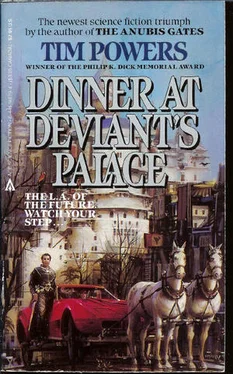And suddenly there came a sound that made Rivas's eyes open wide for a moment in pure astonishment; it was as if a man had channeled a whole valleyful of wind through one mouth-sized hole, and then for years experimented with holding all sorts of inorganic but flexible instruments up to that focus point of wind, exploring all the ranges of sound that could thus be produced, cooings and whistlings and bass rumblings, until finally he was able to approximate human speech.
«Yess,» sighed this implausible voice. «Run along you now, shepherds. Roentgens and rads like to bald you here in minutes only.»
«Right,» agreed the driver cheerfully. «Rags and rajahs gonna make me bald. Probably why rajahs wear rags on their heads, do you think? To cover it. Help him get the sleeping guys out of the wagon, will you, Bernie?»
«Okay,» Rivas heard Bernie say in a strangled voice.
The wagon rocked as Bernie hopped down, his boot nails audibly clicking on the ground. Bemie began hoisting up a body on the far side of the wagon from Rivas, but a moment later there was a sound like someone trying hard to sweep a tile floor with tree branches, and then Rivas felt something thrusting between himself and the floor of the wagon bed. It rolled him over, and he had to open his eyes just a slit.
After a few seconds of stunned staring he decided that the thing prodding at him wasn't a tall fat man with a bucket over his head and bits of cardboard and rusty metal attached all over himself, for Rivas could see blue sky through many gaps in the thing's neck and chest. He saw now that it had bits of glass for eyes, and some arrangement of rusty tanks and dented copper tubing inside the stripped baby carriage that was its chest, and its head was mainly an oversized cocktail shaker in which, in this silence, Rivas could hear something sloshing.
Somehow it didn't occur to Rivas that this was the source of the windy voice, that this thing was in some sense alive, until it spoke again. «Wakeful, this one is,» it whistled, «or near.»
Then without any clear transition, though obviously much later, Rivas was thrashing with nightmares on a cold hard bed in darkness.
His head throbbed painfully and he was terribly thirsty, but every time he got up and went into the kitchen and filled a cup from the water tank and started to drink it, he realized he had only dreamed of getting up and was still in the comfortless bed. Finally he actually sat up—and knew he hadn't done it before because of the unprecedented way it increased the pain in his head—and blinked around at a dim, long room with beds standing every few feet along both walls. The air was stale, and smelled faintly of fish and garbage.
For a while he had absolutely no idea where he was. Then he remembered his fear of losing the job at Spink's, and he tried to get his memory to let him know if that was what had happened. This looks like one of those jigger-a-week rooming houses in Dogtown, he thought, and to judge by how my head feels I've been abusing some truly horrible liquor.
He rubbed his face, and was dismayed to feel a four or five day growth of beard—all over his jaw, too, not just on his chin. That's it, he thought sadly. You're ruined, Greg. Drunk and bearded in the gutter. Bound to happen eventually. If Uri could see you now, wouldn't she be sorry! The fresh-faced boy her father drove away thirteen years ago now nothing but a . . .
He paused in this bathetic reflection, for thinking of Uri had reminded him of something. Of course! How could he have forgotten all that? She'd gone birdy, and he'd risked his life to save her but she'd been taken into the Holy City. That made it an even sadder story—young lovers trampled to bits by an indifferent world—though it would be better if there was someone to know about it, a properly anguished audience . . . maybe he'd go birdy himself, voluntarily this time, just to be to that minimal degree with her at last. . . . What a touch!
Someone in a nearby bed had been gasping and sniffling for a while, and now let go a couple of loud sobs.
«Shut up,» whispered Rivas impatiently. Goddamn noisy bums, he thought.
He heard the person sit up. «You're awake?» came a whisper.
«Think I could sleep in this damned outhouse?» The other person sounded like a girl. If she only knew who I am, he thought bitterly. She probably grew up singing my songs.
To his annoyance she stood up and shambled over to his bed. Jesus, he thought, she's not only sloppy fat but a sport too. Bald as a stone. «I wasn't sure you'd make it,» she said. «You looked real bad when they brought you in. One of the trash men hit you?»
So I've descended to getting into fights with trash men, Rivas thought with something like satisfaction. «I wouldn't be surprised,» he told her. He felt the back of his head. His hair was stiff with dried blood, and there was a lump back there.
«I guess you tried to run.»
«Oh, yeah?» said Rivas, stung. «Bastard probably snuck up behind me.»
«Snuck up behind you,» repeated the girl in a tone of polite but absolute disbelief. «Right.» He was about to argue, but she went on. «I'll be one myself soon,» she said sadly. «Lost my hair a while ago, and got the fever bad now. They'll probably put me in one I helped to build.»
«Probably,» Rivas agreed, not caring what she was talking about. «Now if you'll excuse me, I'd like to—» He stopped talking, for he'd glanced at the window in the far wall, and all he could see through it was night sky . . . and there was no place within Ellay's city walls, except up in the ragged towers, from which one could get an absolutely unobstructed horizontal view of the sky. He stood up, breathed deeply until the sudden dizziness passed, then hurried to the window and looked out.
A glassy plain, flawed with yards-long cracks here and there, reflected the bright stars, and in the distance was the straight white line of a wall dividing the glass from the sky. And then he remembered his decision to follow Uri inside, his meeting with Fracas McAn, the thing that was made of
old litter but walked and spoke . . . . He could remember
nothing beyond that, but clearly this girl must be right, he must have tried to run, and been chased down . . . .
He was thankful that he couldn't remember.
At length he turned away and stared at the form beside his bed that was the girl. «I'm sorry,» he said. «I must not have been making much sense just now. I had . . . forgotten where we are.»
«I wish I could forget,» she said.
«What do you—what do we—do here?»
«Oh"—he saw her spread her hands—"work. There's machines that need tending, and the helium balloons always need patching—»
» Helium balloons?»
«Yeah, big old things for observation along the coast. I don't like that job. I always burn myself with the iron, and the glue makes me dizzy.»
«Ah.» Obviously she means hot air balloons, he thought.
«And we build the trash men too, to do the really heavy work, though I understand we're not making 'em as good as they used to be made. People say the Lord is getting tired of everything and doesn't care so much that things be done just right anymore. And down at the beach the men mainly build and repair boats. That' s probably where you' ll be sent.»
Something was moving, way out there on the glass plain, and Rivas turned back to the window. In the middle distance a thing was limping wearily along. It looked like a huge misshapen puppet that someone had made of papier-mache stretched over a wire framework and had then partially burned, and it plodded along on its uneven legs as if on an errand that would take centuries to complete.
Rivas turned to the girl again, feeling like a child lost in a strange, cold house. «You said,» he began, but his voice came out soprano and he tried again. «You said put you in one of the ones you made. What did you mean?»
Читать дальше












